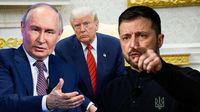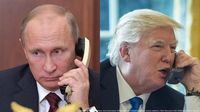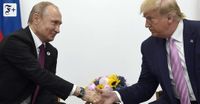In a recent turn of events, former President Donald Trump has attracted significant attention with his decision to halt G7 plans aimed at controlling Russia's shadow fleet, a maneuver that is likely to yield far-reaching economic consequences. The decision signifies not only a shift in U.S. foreign policy but also Trump's commitment to a pragmatic approach toward Moscow, which has raised eyebrows among analysts and political experts worldwide.
The European members of the G7, including Germany and France, had proposed stronger oversight and stringent controls over what’s colloquially known as the 'shadow fleet' of Russia, which operates older tankers under changing flags to evade sanctions. The G7's initiative included plans for enhanced satellite data utilization, stricter regulations in international ports, and more rigorous measures against insurance companies that cover such transports. However, the United States, under Trump's leadership, vetoed these measures, citing concerns about market stability and worrying that tougher actions against Russian oil could drive global prices up, negatively affecting consumers worldwide.
Trump's decisions reflect a strategic alignment with pro-Russian sentiments concerning the ongoing Ukraine war. Observers noted earlier negotiations initiated by Trump in Saudi Arabia, which excluded Ukraine, hinted at a changing direction in U.S. policy. This volatility was further exemplified by Trump's questioning of Western arms shipments to Ukraine and a series of diplomatic missteps, like his controversial meeting with Ukrainian President Volodymyr Zelensky at the White House.
Meanwhile, the economic landscape in Russia faces challenges as demand for its energy resources wane. Reports indicate that China's crude oil imports dropped by 10.5 percent in early 2025 due to decreasing demand, impacting revenue streams for Moscow. Additionally, overall imports from Russia plummeted by 3.9 percent when measured against the U.S. dollar. With sanctions breaching the typical pathways of oil shipment, the costs and transportation times for Russian oil have surged dramatically, complicating matters further for Moscow, which is already under immense financial strain.
In fact, estimates show a 6 percent fall in revenue from fossil fuels for Russia just last month, driving home the effects of sanctions instituted by Western nations. Notably, the share of Russian crude oil transported via shadow fleet decreased from 65 percent in January to 56 percent in February, while processed oil products showed a similar decline from 40 to 32 percent, suggesting a slow, albeit noticeable, impact of the imposed sanctions.
Furthermore, the geopolitical landscape is shifting as the United Kingdom, alongside the European Union, Canada, Japan, and Australia, firm up their stance against Russia. The British government's role is pivotal, seeking stricter measures to contain the shadow fleet perceived as an ecological risk following multiple maritime incidents involving Russian tankers.
Turning to recent diplomacy, Trump and Putin engaged in a phone call that, while aiming for peace in Ukraine, yielded underwhelming results. Following a 30-day halt on bombings of Ukrainian energy infrastructure, which both leaders agreed upon, Putin asserted the necessity of ceasing all military aid to Ukraine as a prerequisite for peace. The Kremlin also disclosed plans for a significant prisoner exchange, offering to return severely wounded Ukrainian soldiers.
Nevertheless, political analysts like Anton Barbaschin from the think tank Riddle Russia argue that Trump's suggestion for a ceasefire is more symbolic than substantive. They point out that Putin uses small compromises to appear cooperative while imposing additional conditions to stall genuine progress towards a full ceasefire. Observers also noted that Trump’s recognition of occupied territories during discussions points toward a less than idealistic approach to the resolution of the Ukrainian conflict, leaning heavily on a pragmatic outlook.
Trump’s telephone dialogues with Zelensky further emphasized U.S. support for Ukraine, as the Ukrainian president expressed faith in achieving a durable peace. Reports indicated that Trump informed Zelensky of the discussions with Putin, which he deemed “very good and productive.” Each party appears ready to navigate a path that accommodates their respective interests, although uncertainty reigns over the extent to which these motivations will translate into concrete action.
At the same time, negotiations are reportedly planned to continue, with U.S. representatives engaging with both Ukrainian and Russian officials in attempts to foster further dialogue on a ceasefire. The upcoming discussions promise an opportunity for substantive discussions, although prior commitments have materialized slowly and sporadically.
To sum up, Trump's halting of G7 plans to control Russian oil operations alongside recent diplomatic efforts with Putin demonstrate a calculated approach tinged with both risk and potential instability. While the economic ramifications are still unfolding, the international community keeps a wary eye on U.S. actions in the sphere of global diplomacy.




